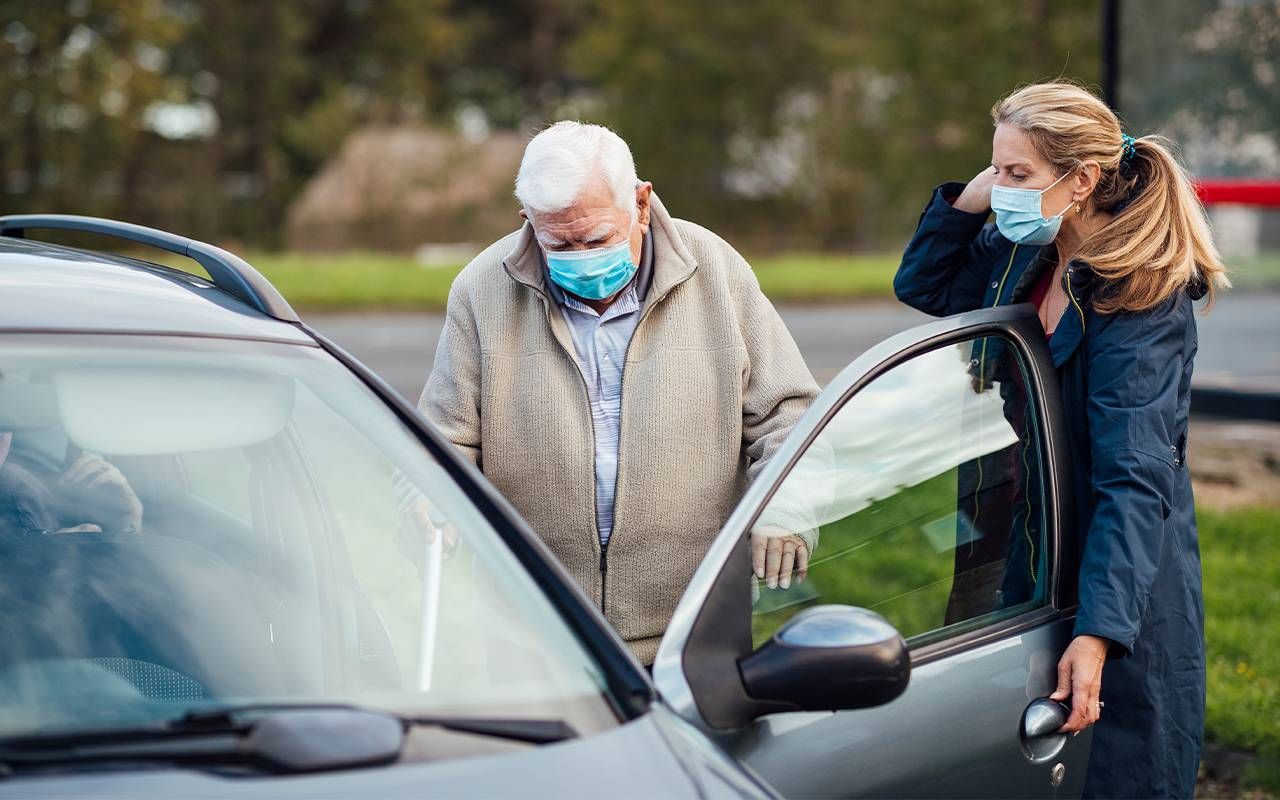The Struggle Between Grace and Space in Caregiving
The delicate line of erring on the side of caution when it comes to caring for your parent
My 92-year-old father announced that he and his 86-year-old girlfriend, sporting a brand-new titanium knee, were going to a state park for a three-day visit in the fall. "Dad," I asked him, "how will you get your luggage from the gravel parking lot and up the steps to the state park inn?"

He said, "We've already thought of that. We'll take small bags and put them on our walkers." Dad, who had traveled all his adult life until the pandemic, couldn't see any problem with it. Dad can't sometimes get up from a chair and has an unsteady gait like Frankenstein's monster. I could see a problem with it.
My younger brother and I communicate daily and go back and forth between Good Cop and Bad Cop with our father.
Fifteen years ago, when my family rallied to help my father care for my mother, who was declining with dementia, I could not have imagined difficulties with Dad. Yet, the state park vacation trip is at the heart of many recent discussions. My younger brother and I communicate daily and go back and forth between Good Cop and Bad Cop with our father.
My remaining parent is frail, forgetful and feisty. I have a lung disease that limits my mobility and travel. However, many baby boomers, born between 1946 and 1964, still have a living parent as they themselves struggle with aging issues.
The Grace to Let Our Dad Be Independent
My brother and I are thankful to have Dad in our lives and celebrate the most memorable moments, like when Dad met his first great-grandson this summer. For the most part, we try to give Dad the space and grace he deserves.
When Dad makes poor judgments, I quote what he often said to his children: "I would like to whoop you upside the head."
Dad wants and deserves a whole life, and his children, my baby brother and me, don't want to deprive him. Dad was in good health until about two years ago. He exercised and extensively used a stair stepper. Today his physical and mental health fades, and we are also concerned that he can put himself — and others — in danger.
In 2019, I took Dad to visit our son, his elder grandson, in Washington, D.C. I use oxygen therapy and have trouble walking a long distance; my portable compressor and cord weigh about 11 pounds. I also had my purse (which my husband has mistakenly guessed its weight at 25 pounds, not even close).
The Challenge of Travel
Dad and I checked our bags. I paid for the airport concierge service, and a valet pushed Dad in a wheelchair, carry-on in his lap. I couldn't keep up and ambled along, reaching the two of them at the gate. I arranged for a car to pick us up at baggage because there was no way I could handle Dad, his cane, two bags, my oxygen, my accursed purse and Dad's carry-on.
My son doesn't drive or own a car, so we Ubered almost everywhere in the city. While I was familiar with the Metro, Dad could not handle the long escalators with his precarious balance. The trip was exceedingly challenging, and I was exhausted when we returned. This was the third time I had taken Dad to D.C.
I was glad that we went and felt that we had appropriate accommodations. Unfortunately, Dad did not want to bring his walker and has never fully embraced his cane. The facility where he lives has onsite rehab, and they've worked with him on using his cane for several years. But he drags it behind him, rendering it completely useless.
Am I wrong to express this concern? Should our grace to him extend to something my brother and I feel is entirely unsafe for Dad?
I cannot do it again; it's easier for the grandchildren to visit Dad, where he lives. I am sad for him, but I believe his traveling days are done, and mine are limited. In addition to the portable compressor I need for daytime, I have an ungainly 40-pound continuous oxygen compressor I need to use at night. So we can no longer fly, and driving with my diabetic husband makes us feel like a M*A*S*H* unit bugging out of South Korea.
There have been multiple episodes that I consider evidence in this verdict that Dad should no longer travel. He and his girlfriend went to their county fair, where they forgot where they had parked. The police had to help them find the car.
Another time, when he still had a car, he rarely drove it, and the battery ran down. Somehow that impaired the automatic lock system, and he got in the car to go somewhere, and it wouldn't start, nor could he get out. His car was parked inside a carport, and it was hours before someone saw him motioning inside the vehicle.
A Question of Judgment
Where was his cell phone? It was where he always kept it, in the trunk of his car. My brother and I constantly reminded him to keep the phone in his pocket, to no avail.
Dad no longer drives; after some horrifying moments in his 2000 Park Avenue Buick (made by the same folks that made the Saturn V moon rocket), he stopped driving on his own. His girlfriend, yet, still drives, though she rarely leaves town. The trip to the state park is about sixty miles one way. Whether she drives or not is technically none of our business. That our father rides with us is our business.
My brother and I both feel somewhat guilty about refusing to take Dad on more trips. It's painful to tell him he cannot go to a Cubs game, where he might have to walk a mile to parking and climb up Wrigley's old steps to the seats. We cannot prevent him from breaking a hip, but we certainly don't need to encourage it.
Before the pandemic, we often traveled with Dad, including a 16-day trip to Europe when he was in his early eighties after my mother died. Dad now has swallowing problems, and even a local restaurant provides challenges. Nevertheless, we are tired of fighting with him, so we've surrendered: I will call the state park several days before their arrival and give management a heads up over their fragility. And my brother will rescue them if something happens.
After our conversation about going to the park, I asked Dad, "You are not going to go horseback riding, are you?" A long pause from Dad, "Well, I guess not." I cannot imagine how he could mount a horse in his present condition. I checked the park's rules, and there is no maximum rider age. Am I wrong to express this concern? Should our grace to him extend to something my brother and I feel is entirely unsafe for Dad?
This situation is a difficult balance because I question his judgment about riding a horse. He's gone horseback riding at our state parks for my entire life. I'm 25 years younger than Dad, and I have to make daily choices because of my oxygen compressor.
You can't go zip-lining over a canyon while wearing an oxygen compressor. How mad would I be if my adult son needed to point this out to me? So, we err on the side of grace and space, and then cross our fingers and ourselves, praying that nothing bad happens.


